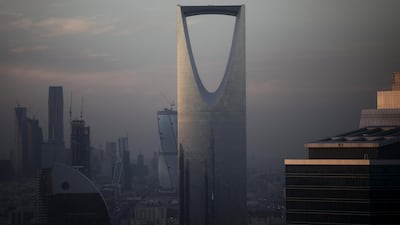Saudi Arabia's non-oil private sector businesses registered strong growth in May on the back of a sustained surge in output as prices charged for goods and services in the kingdom rose for the first time in seven months.
The headline seasonally adjusted Emirates NBD Saudi Arabia Purchasing Managers' Index (PMI) – a composite gauge designed to give an overview of operating conditions in the non-oil private sector economy – climbed to a 17-month high of 57.3 in May, up from 56.8 in April. The index has now risen in six of the past eight months, signalling a sustained improvement in growth momentum in the biggest economy of the Arab world.
Output across the non-oil private sector rose sharply, rising the most since December 2017, buoyed by stronger underlying demand conditions, Emirates NBD said in the PMI report produced by IHS Markit.
Inflows of new business also increased steeply at the fastest rate in four years. This partly reflected a further pick-up in export orders, which rose at the quickest pace since February 2017.
“The gradual rise in the headline PMI this year suggests that growth in the kingdom’s non-oil private sector is recovering after a relatively soft 2018,” Khatija Haque, head of Mena Research at Emirates NBD, said on Monday.
“Other indicators, such as an improvement in private sector credit growth and rising point of sale transactions in the first quarter of this year are consistent with a modest rebound in private sector activity.”
Companies across the non-oil private sector also scaled up purchasing activity during May to support increased output requirements. Growth in buying levels reached the strongest since late 2017, as a number of businesses looked to bolster stock levels amid expectations of higher demand going forward, Emirates NBD said.
While the picture for output and new orders improved, data showed that job creation across the non-oil private sector remained lacklustre. The rise in employment in May was the highest since January but only marginal overall. This was consistent with signs of relatively low pressure on business capacity, as evidenced by weak growth in work backlogs.
Confidence among non-oil private sector companies towards future output, however, remained strong in May due to positive forecasts for underlying economic conditions and plans for improved products and services.
Saudi Arabia's economic reform agenda has started yielding positive results and employment along with the non-oil growth, one of the key objectives of the Vision 2030 national transformation plan that seeks to diversify the kingdom's economy, the International Monetary Fund said last month.
Last year, the biggest Arab economy accelerated 2.2 per cent after contracting in 2017. Real oil GDP increased by 2.8 per cent while non-oil GDP growth rose to 2.1, the IMF said. The non-oil economy of Opec’s top oil exporter is expected to further strengthen to 2.9 per cent in 2019, according to the lender.


